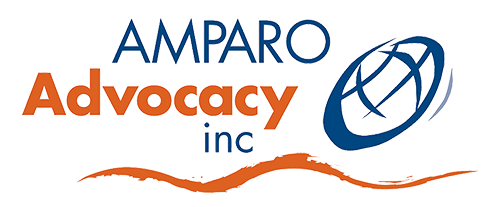Systemic Advocacy
Independent Systemic Advocacy
Since 2004, AMPARO has played a key role in highlighting the voices and concerns of Queenslanders with disability from culturally and linguistically diverse (CALD) backgrounds.
AMPARO’s direct work with individuals and their families continues to inform our understanding of the systemic failures that disadvantage and marginalise many people from CALD backgrounds with disability.
AMPARO has a strong history of undertaking independent systemic advocacy to effect positive, sustainable changes to legislation, policies, practices, and approaches that contribute to issues of inequality.
Through systemic advocacy, we responsibly challenge systems, approaches and values that can negatively impact the lives of people with disability and question the coherency between what human services and governments say and what they do in practice.
The Final Reports by the Disability Royal Commission into the Violence, Abuse, Neglect and Exploitation of People with disability were released last year in 2023. AMPARO was pleased to see many of our concerns reflected throughout the reports, which articulate an important vision of a future where people with and without disability:
- Live, learn, work, play, create, and engage in safe and diverse communities.
- Have the power of choice, independence and the dignity to take risks.
- Make significant contributions to communities that value their presence and treat them with respect.
The report summarises the main barriers to NDIS access and other relevant disability services for this cohort. AMPARO Advocacy is open to providing further illustrations if needed, demonstrating its commitment to raising awareness and addressing challenges faced by the CALD community with disabilities.
About the Disability Royal Commission
The Disability Royal Commission was established in April 2019 in response to community concern about widespread reports of violence against, and the neglect, abuse and exploitation of, people with disability. These incidents might have happened recently or a long time ago.
AMPARO Submissions:
- Promoting Inclusion: A Response to the Issues Paper
- The Experiences of CALD People with Disability: A Response
- Submission to the Royal Commission into violence,
abuse, neglect and exploitation of people with disability (2020) - Key Issues Impacting People from a
CALD Background with Disability in QLD (2022)
AMPARO launched this report at the Griffith University Symposium on 11 October 2016.
The report aims to highlight longstanding disadvantages and additional barriers that have contributed to ‘decades’ of lower levels of participation in specialist disability services by people from CALD backgrounds with disability. It makes 25 recommendations to inform the development of social policy, strategies and practices that will support equitable access and participation in the NDIS.
In February 2022, the NDIA shared their co-design approach to developing a new CALD Strategy and Action Plan for 2023 -2027 with people from CALD backgrounds with disability, their families, communities, advocates, and the broader sector.
In August 2022, AMPARO Advocacy and many other stakeholders joined the Cultural and Linguistic Diversity (CALD) External Advisory Group (EAG) to provide strategic advice, governance and oversight for the co-design and development of the CALD Strategy.
The EAG was an important opportunity for AMPARO to influence the development of a strategy that would, unlike the previous CALD Strategy of 2018, be able to address the systemic barriers and inequity in the current NDIS system.
AMPARO was clear that we could not support a Strategy and Action Plan that could not deliver the outcomes we wanted and would continue to monitor changes and provide honest and robust feedback to the NDIA.
Over the past two years, the NDIA has implemented a range of engagement strategies with people with disabilities, their families, advocates, and other stakeholders. These have included focus groups, community conversations, public information sessions, online surveys, and written submissions.
AMPARO Advocacy has provided detailed and extensive feedback, raised serious concerns, and made suggestions for improvements to the draft CALD Strategy and Action Plan through a range of processes, which have included:
- Attending NDIS CALD Strategy Summit in February 2022 and 2023 to provide feedback on the new CALD Strategy updates and proposed actions.
- Participating in two forums organised by the Independent Advisory Council’s Equity and Inclusion Reference Group.
- Participating in several online focus groups.
- Organising a Community Conversation with people with disability and family members from the Arabic-speaking communities in the Logan/Brisbane areas and supporting a Community Conversation in Toowoomba with the Kurdish Kurmanji-speaking community. Providing feedback from these events to the NDIA.
- Encouraging allies across the sector to attend and participate in the NDIS focus groups.
- Supporting members of AMPARO to participate in NDIS Focus Groups and community conversations.
- Providing written feedback on several drafts of the Strategy and Action Plan Participating in the endorsement meeting on 2 August 2023
- Providing feedback on communication materials
- Sharing relevant submissions about the NDIS, previously provided to the NDIA and the DRC, to highlight systemic issues that need to be addressed.
AMPARO Advocacy’s work with individuals confirms that these and other systemic barriers continue to prevent Queenslanders with disability from culturally and linguistically diverse (CALD) backgrounds from having their most basic needs met.
Key barriers highlighted in this position paper include:
• Perceptions, myths and stereotypes about disability;
• Lack of information about rights and entitlements;
• Lack of information about the availability of services, programs and benefits;
• Shortage of interpreters and failure to use professional interpreters;
• Lack of information about how to access and how to work effectively with interpreters;
• Difficulty understanding legal and social systems;
• Service systems that are not culturally competent; and
• Immigration and social security law that discriminates.
Read more:
AMPARO Advocacy was very excited to be approached by the School of Public Health and Social Work at Queensland University of Technology (QUT) in 2013 to participate in a research project: An exploration of the barriers to services and inclusion of refugees living with disability.
“Disadvantage and disability: Experiences of people from refugee backgrounds with disability living in Australia”
This paper reports on a small study undertaken as a first step in building knowledge and regarding the lived experience of the nexus between refugee background and disability.
“Restrictive practices on refugees in Australia with intellectual disability and challenging behaviours: a family’s story.”
The purpose of this paper is to explore the experiences of a refugee family navigating complex disability and restrictive practice service system.
We do this by
- Bringing key issues to the attention of those in positions of power and influence in the government and community
- Responding to State and Federal government legislation, policies and practices
- Participating in advisory groups to government and community
- Undertaking joint systemic advocacy with our allies
- Attending and supporting members to participate in consultations and forums with the government and community to share their lived experiences and concerns.
This work assists the government and community to understand the specific challenges and issues experienced by people from CALD backgrounds with disability and to explore ways of addressing these challenges. A small number of state-wide systemic priorities are identified and responded to each year by AMPARO Advocacy.
Peak and Representative Body
In September 2023, the Department of Child Safety, Seniors and Disability Services funded AMPARO Advocacy as a Peak and Representative body for people from CALD backgrounds with disability.
The Department of Child Safety, Seniors and Disability Services established the Queensland Disability Peak and Representative Body Program, which funds organisations to deliver peak body services to Queenslanders with disability, their family members and carers.
The role of Peak body organisations is to help and support people with disability:
- with accessible and disability-specific information on systemic issues impacting people with disability
- with online and state-wide phone support and referral services
- through news, advice, referral information, and communication about support and services available in Queensland, including information to access the NDIS
- by providing expert advice and feedback to the government on matters impacting people with disability
- by promoting community awareness, education and training information for organisations, employers, and the broader community to influence community attitudes and remove barriers to inclusion
- by developing resources to support employers in attracting, recruiting and retaining people with disability.
More information on the program and the providers in the ten categories can be found here: Peak body supports | People with disability | Queensland Government
Queensland Executive Disability Peak Body
Queenslanders with Disability Network (QDN) provides an overarching leadership and coordination role across funded peak bodies. QDN also provides information, advice and support to people with disability about their rights, available services and opportunities for economic and social participation.
Phone: 1300 363 783

